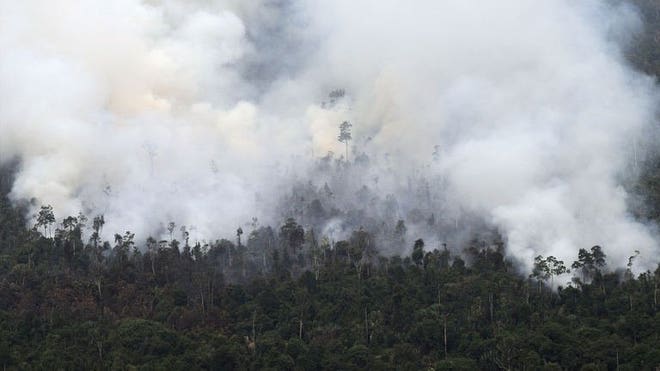JAKARTA (AFP) – Fires in Indonesia that have cloaked Singapore in record levels of smog highlight the continued failure of efforts to prevent illegal slash-and-burn land clearance in a country with a history of chaotic forest management, activists say.
The blazes on hundreds of hectares (acres) of carbon-rich peatland on Sumatra island have sent vast palls of acrid smoke drifting over Singapore, shrouding residential blocks and downtown skyscrapers.
While forest and peat blazes caused by illegal slash-and-burn clearances in Indonesia are an annual problem in the dry season and frequently cloud Singapore's skies, this year the levels of haze have hit record highs.
Singapore has been badly affected due to to a combination of factors -- the blazes are centred in Riau province, just west of the island, they are underground in peatland and therefore hard to extinguish, and the wind is blowing the smoke over the city-state.
The acrid smoke began enveloping Singapore earlier this week, but there was a glimmer of hope for residents on Saturday as the thick smog gave way to a spell of blue skies and smoke-free air.
The crisis has brought more negative publicity for big palm oil companies -- Indonesian, Singaporean and Malaysian -- which deforest vast swathes of Sumatra, although the companies insist they have strict "no burn" policies.
They have been accused of starting many of the fires to clear land through the practice of slash-and-burn, which is illegal but still frequently used because it is the quickest and cheapest way of preparing land for plantations.
Clearing land with fires is far cheaper than using bulldozers or excavators.
While environmental groups have been leading the charge against the companies, they say such problems would not occur so frequently if Indonesia properly enforced laws that ban slash-and-burn clearances.
Legislation has not been properly implemented due to gaps in capacity, such as a lack of field officers, said Anwar Purwoto, forest programme director for WWF Indonesia.
"We need high political commitment followed by political will from central down to local government," he told AFP.
An Lambrechts, a forest campaigner with Greenpeace, added: "The causes that underlie these fires are agriculture, expansion and expansion of plantations."
But she said it was down to the government "to impose its own legislation much more strongly -- these fires are illegal".
However, senior forestry ministry official Hadi Daryanto told AFP stopping such fires was "not simply about law enforcement".
"We cannot determine whether this is related to economic, social, environmental or political problems," he said, pointing to the fact that it was not simply big companies setting vast swathes of virgin forest alight to turn a quick profit, but that small landowners were also setting fires.
WWF's Purwoto said many of the fire hotspots in Riau were actually on land owned by local communities rather than big companies.
"Both communities and private companies should be responsible for addressing the problem," he said.
The failure to tackle slash-and-burn clearances is part of a bigger picture of the notoriously difficult challenge Indonesia faces in trying to protect its swathes of rainforest.
The vast archipelago sprawls over more than 17,000 islands, and power is heavily decentralised, making land management very chaotic.
While the government has made progress, notably with a moratorium on new permits for logging primary forest, it is still difficult to keep track of what is happening on the ground and who might be breaking the rules.
The corruption that is endemic in Indonesia is also present when it comes to the forestry sector and the granting of concessions.
A stark illustration that points to problems in Riau itself is the fact that the province's governor has been arrested by corruption investigators -- and one of the allegations he faces relates to the issuance of logging permits.
Some companies that have been accused, such as Asia Pulp and Paper (APP), have insisted they do not carry out slash-and-burn clearances.
"We do not practise, and highly condemn the slash and burn activity for its detrimental impact to the environment and the rainforests," the company said in a statement.
While activists believe the government needs to enforce existing laws more strongly, even they recognise the difficulties for an emerging country such as Indonesia.
"Indonesia is a young democracy, so it is in the process of finding out how decentralisation can work in the best possible way," said Greenpeace's Lambrechts.


